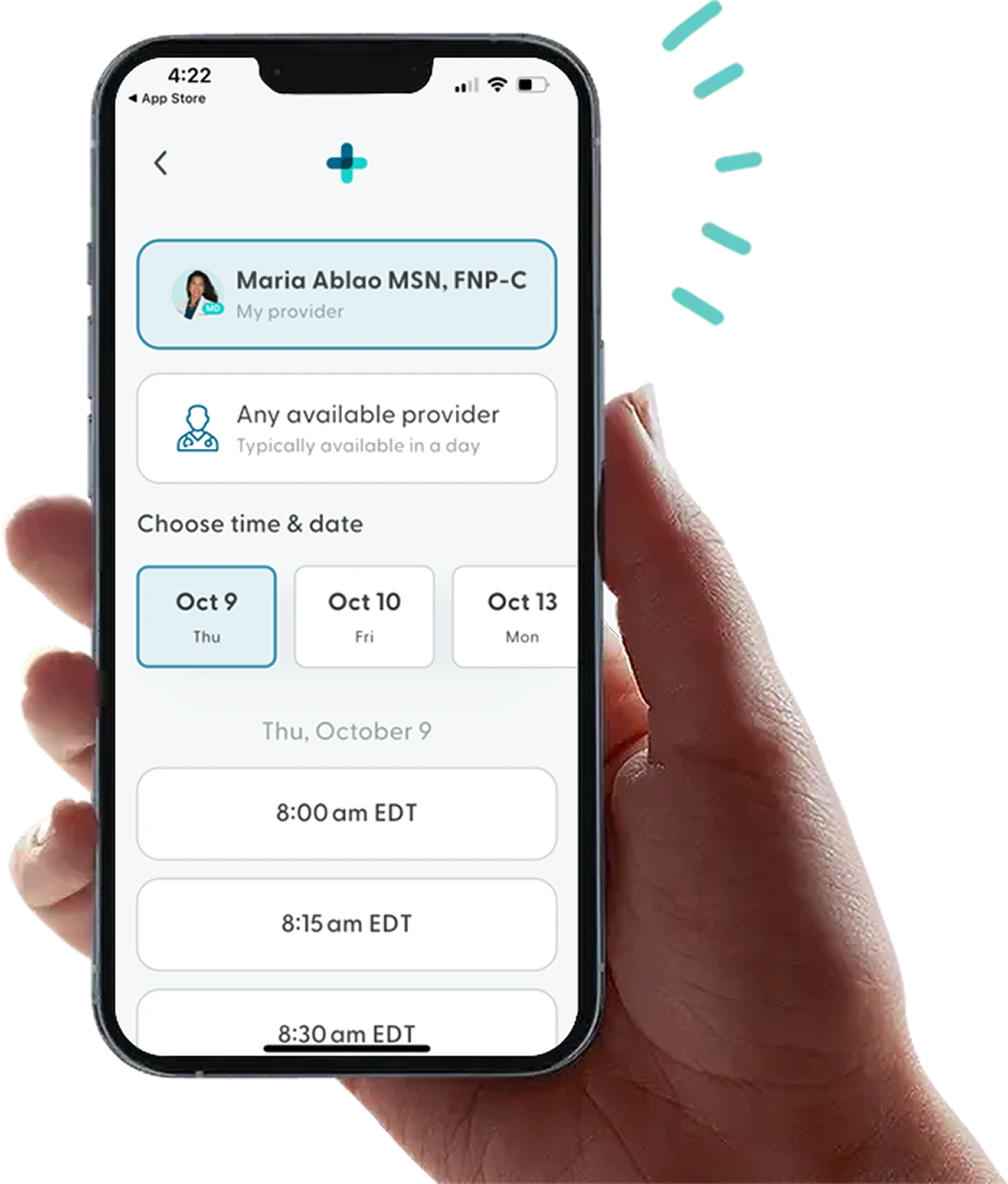Losing Weight with Hypothyroidism: Everything You Need to Know
Hypothyroidism is a medical condition that causes metabolism — the process where the body produces energy from consumed food — to slow down. It affects 1 in 300 Americans in their lifetime.
Although rarely life-threatening, hypothyroidism can contribute to other medical issues like chronic disease and mental illness.
It can often cause uncontrollable weight gain, which may impact a person’s self-esteem and quality of life.
In this article, we’ll take a closer look at how and why hypothyroidism causes weight gain as well as a number of strategies to help you live with this condition.
Get prescription weight loss medication online.
Find out if you're eligible for GLP-1s, and get started on your weight loss journey for as low as $75/month.


What is Hypothyroidism?
Hypothyroidism is a medical condition that occurs when the body doesn’t produce enough thyroid hormones. This condition is also known as having an underactive thyroid.
The thyroid hormones — released by the small, butterfly-shaped gland in front of the windpipe in the throat — are essential for helping the body to regulate and use energy.
They also help control key functions like how the heart beats and how the digestive system works. Without enough thyroid hormones, many of the body’s natural functions begin to slow down.
Currently, there is no way to prevent hypothyroidism from developing.
However, effective treatments are available to help thyroid patients manage and live with the symptoms of this condition. We’ll take a closer look at this a bit later.
What are the symptoms of hypothyroidism?
The signs and symptoms of hypothyroidism can vary from person to person, making it difficult to diagnose.
Early warning signs may include:
Unexplained weight gain
Fatigue
The abovementioned symptoms, however, also become more common as we age, regardless of our thyroid health.
This means that hypothyroidism may not be apparent until more symptoms develop. These symptoms may include:
Changes in the texture of the skin (may appear scaly, rough, and dry)
Brittle nails
Depression
Constipation
Decreased sweating and feeling cold
Slow heart rate
Dry and thinning hair
Muscle weakness or aches
Impaired memory
Joint pain or stiffness
If you’re experiencing any of these symptoms, be sure to make an appointment with your healthcare provider.
What causes hypothyroidism?
There are a number of medical conditions, treatments, and lifestyle factors that can contribute to the development of hypothyroidism.
The most common causes of hypothyroidism are autoimmune conditions. Hashimoto’s – an autoimmune disease that attacks the thyroid gland and reduces its function – is typically the leading reason.
Other common causes may include:
Radioactive iodine treatment
Radiation therapy
Thyroid surgery
Certain medications used to treat mental health conditions (lithium), cancer (interleukin-2 and anti-CTLA-4), and heart disease (Pacerone)
HIV treatments like stavudine
Iodine deficiency
Hashimoto’s thyroiditis—an autoimmune disease that attacks the thyroid gland and reduces its function
Other, less common causes of hypothyroidism include:
Congenital disease
Pregnancy – If you are pregnant or trying to become pregnant, talk to your doctor about the risks of underlying Hashimoto’s disease. Be sure to have your thyroid stimulating hormone (TSH) checked out. Normal TSH levels should not be higher than 2.5.
Pituitary disorders
De Quervain thyroiditis
Key Point: Who is More at Risk of Developing Hypothyroidism?
Hypothyroidism can affect anyone, but certain groups of people may be more at risk of developing this condition. These include:
- Women
- People over the age of 65
- Individuals with a family history of thyroid disease
- People who have existing autoimmune diseases like celiac disease or type 1 diabetes (Typically, having one autoimmune disorder puts you at a higher risk of developing another.)
- Patients who have received treatment for hyperthyroidism (where the thyroid is overactive)
- Individuals who have had thyroid surgery
- Patients who have received radiation therapy in the neck or upper part of the chest
Why Does Hypothyroidism Make You Gain Weight?
The thyroid gland is responsible for regulating your metabolism — also known as the process whereby the body converts food and drink into energy.
When the thyroid is underactive, metabolism slows down and takes a longer time to convert food into energy. The body also struggles to get rid of excess salt and water.
These two factors are known causes of gaining weight, especially if they’re not managed correctly.
How Can You Lose Weight with Hypothyroidism?
Although weight loss can be challenging if you’ve been diagnosed with hypothyroidism, there are a number of things you can do that can help speed up your metabolism.
It mainly involves making dietary and lifestyle changes that are meant to improve thyroid function. Let’s take a closer look at these weight loss strategies.
Ready to achieve your weight loss goals?
Shed pounds with GLP-1 medication prescribed online by licensed healthcare providers for as low as $75/month.


Cut out simple carbs and sugars
Foods with a high glycemic index (GI) — like refined sugars and simple carbohydrates — are the main cause of a spike in our blood sugar.
When this spike occurs, the body must release the hormone insulin to help bring blood sugar levels back to normal.
If this happens too often, the body may develop insulin resistance and begin converting excess sugar into fat. This is what causes weight gain.
Alongside an underactive thyroid that struggles to regulate your metabolism and energy levels, a diet filled with high-GI foods will likely make you gain weight.
However, following a diet free from simple carbohydrates and sugars can help you bring your weight under control.
This means avoiding the following foods as far as possible:
Sweets
Sodas and other sugary drinks
Preservatives
White bread and flour -- Celiac disease and Hashimoto’s often coexist, so removing gluten from your diet may benefit your thyroid.
Processed meat
You should also try following a low-carb diet and incorporating these foods into your diet:
Complex carbohydrates like oats and brown rice
Legumes like lentils and black beans
Fruits
Healthy fats like olive oil and nuts
Starchy vegetables like sweet potatoes and beets
The food choices mentioned above are denser in nutrients and also release sugars into the bloodstream gradually. This helps to control insulin levels and maintain a healthy weight.
Incorporate more anti-inflammatory foods into your diet
Anti-inflammatory foods can help alleviate some of the symptoms associated with hypothyroidism like joint aches and depression.
They might also help soothe the immune system and reduce unnecessary inflammatory responses — these can be detrimental to the body if they occur too frequently.
Following an anti-inflammatory diet mainly involves incorporating foods that contain specific vitamins and minerals into your meals. These include:
Magnesium (found in whole grains and dark-green, leafy vegetables)
Vitamin B (found in chickpeas and broccoli)
Zinc (found in red meat or poultry, shellfish, and beans)
Vitamin C (found in citrus fruits and starchy vegetables)
Iron (found in red meat, seafood, certain beans, and dried fruit)
Eat smaller meals more frequently
Hypothyroidism is a condition that slows down the metabolism and increases digestive difficulties.
Eating smaller meals can help the body fully break down the food and absorb the nutrients it needs.
Smaller portions also help to support balanced blood sugar levels and avoid the spike often caused by large, high-processed meals.
Exercise daily
Getting enough exercise is an important complement to a healthy diet for people living with hypothyroidism.
Not only does it help you burn calories to aid weight loss, but it can also increase your energy levels and reduce fatigue.
Studies have also shown that exercise can improve mental well-being, even alleviating symptoms of anxiety and depression.
Some individuals dealing with the mental effects of hypothyroidism may find exercise to be an effective way to manage their symptoms, alongside maintaining a healthy body weight.
Should You Take Medication for Hypothyroidism?
If you’ve been diagnosed with hypothyroidism, your doctor will likely recommend a thyroid-stimulating hormone medication called levothyroxine (Levo-T and Synthroid).
This medication promotes healthy thyroid function and can help return the thyroid hormone levels to normal, which will contribute to alleviating symptoms associated with hypothyroidism.
They may also help to improve the health of the body’s natural processes that have been affected by this condition.
Supplements like selenium, omega 3, and vitamin D can also help the thyroid. Be sure to consult a licensed medical professional before taking any over-the-counter medications or supplements.
Can Thyroid Medication Affect Your Weight?
Over time, thyroid medication can help you to lose weight as it starts bringing hormone levels back to normal.
This largely has to do with the fact that your metabolism will start to function correctly again and your body will be able to get rid of excess water and salt.
Although thyroid medication can have some impact on your weight, more research is needed to draw a conclusion about the exact impact it has on the body.
Key Point: What are Some of the Complications Caused by Untreated Hypothyroidism?
Hypothyroidism is a medical condition that should be taken seriously. If not, it may go undetected and untreated, which can cause complications like:
- Goiter or enlargement of the thyroid that may cause breathing or swallowing difficulties
- Increased risk of developing heart disease and failure
- Infertility
- Birth defects
- Peripheral neuropathy or damage to the nerves that relay information from the brain and spinal cord to the rest of the body
- Myxedema coma, a rare and life-threatening condition that causes an extreme lack of energy and even unconsciousness
Where Can I Learn More About Hypothyroidism and Weight Loss?
If you’ve been struggling with weight gain despite managing your thyroid, you’re not alone — and you don’t have to do it alone. At LifeMD, we help you tackle both your metabolism and hormone health so you can finally see results. With our Weight Management Program, you’ll get personalized guidance from our medical team and access to safe, effective weight-loss medications like GLP‑1s, all designed to support your goals.
At the same time, our Women’s Health Program ensures your thyroid and other hormones are balanced, with expert care from board-certified providers and a treatment plan tailored just for you.
Take control of your health today — schedule a LifeMD consultation and start your journey to feeling like yourself again.
More articles like this
Feel better with LifeMD.
Your doctor is online and ready to see you.
Join LifeMD for seamless, personalized care — combining expert medical guidance, convenient prescriptions, and 24/7 virtual access to urgent and primary care.

GLP-1
Zepbound® Wegovy® Saxenda®
This is it! Be part of the weight loss movement everyone’s talking about.
Get Started Now
 Medically reviewed and edited by
Medically reviewed and edited by 








